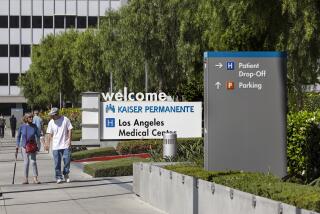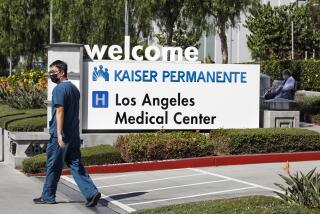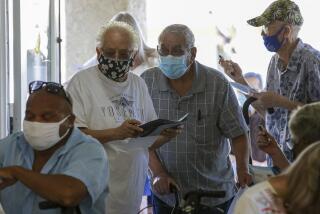Many Managed Care Firms Get Good Marks in Survey
WASHINGTON — Many of the nation’s leading health maintenance organizations are doing a much improved job of making sure their patients get immunizations, undergo preventive screening tests and receive the most effective treatments for serious problems such as heart disease, according to an independent survey of health plan quality issued Wednesday.
In California, the Kaiser Permanente system had a particularly strong performance, as reported by the National Center for Quality Assurance in its annual study of the “State of Managed Care Quality.”
The survey looked at 466 health plans covering more than 50 million Americans, people enrolled in HMOs and other health organizations that agreed to an independent performance audit by the private nonprofit group funded by the health industry and corporations to promote quality health care.
The studies have become the most precise instruments yet developed in the fledgling science of measuring the delivery of high-quality treatment and comparing the results among health plans. The quality assurance center reports are used by many major corporations as a guide in helping their workers choose among an often-confusing array of health plans.
Although its influence is growing, the center still measures only the data for a minority of American consumers because most health plans are not yet willing to spend the money needed to gather and process the information required by an audit. Or the health plans may agree to an audit but will not permit the center to make the results public.
“In terms of quality, 1999 was by far the best year in the history of managed care,” Margaret E. O’Kane, president of the quality assurance center, told a news conference. “But when we look at care for certain populations, like people with diabetes or depression, it’s obvious that there is still room for improvement.”
Some of the biggest advances have taken place in the rates of childhood immunizations and in cardiac care, the center reported.
Among families enrolled in audited plans, more than 65% of 2-year-olds were vaccinated against chickenpox last year, compared with 41% in 1997, the first year the immunization rate was studied by the center.
Among patients who have had heart attacks, 85% are receiving the recommended drugs, beta blockers, a major improvement from the 62% who were getting beta blockers in 1996, when the study was first made.
In fact, the center’s measurement and reporting system is “leading a quiet revolution in cardiovascular care,” said Dr. Thomas Lee, medical director of Partners Community HealthCare in Boston, who attended the news conference. The system “is pointing health plans and providers to focus more attention on things that save lives--lowering cholesterol, controlling hypertension and prescribing beta blockers after a heart attack,” he added.
The health plans are not as likely, however, to treat with the most advanced methods such diseases as diabetes and depression.
The quality assurance center audits report on 60 different measures of health care services. The system did its first studies 10 years ago with screening rates, and it has now moved to more sophisticated measures such as the control of high blood pressure and cholesterol and counseling women on menopause.
The Kaiser system, with central data management, has been notably successful in its ability to keep track of delivery of services to individual patients.
In the Los Angeles area, for example, 79% of children in the Kaiser plan have had well-child visits to the doctor at ages 3, 4, 5 and 6, compared with a national average of 48%. The second-ranking plan among the seven audited was Prudential, with 44% of the children receiving the checkups.
For those who suffered heart attacks, 80% of the Kaiser patients had their cholesterol controlled at acceptable levels, compared with a national average of 67%, the center said. PacifiCare was the runner-up in the region, with a 67% figure.
The Kaiser system generates a computer printout whenever a member sees a doctor. A woman might be seeing the doctor for back pain but the computer printout she carries from the reception desk to the doctor might contain an “M” to remind the doctor to tell her she should have a mammogram to screen for breast cancer. The automated data system is used to “prompt physicians whenever they see a patient,” said Dr. Joel Hyatt, a family physician and assistant medical director of Kaiser Permanente in Southern California, which covers the region from San Diego north to Bakersfield, and from Ventura east to Palm Springs.
Quality assurance center audits or other studies have not yet developed methods to look at perhaps the most vital of all health measures--successful outcomes.
In coming years, federal agencies and private health organizations hope to develop more predictive counts on, for instance, which health plan has the best survival rates five and 10 years later for women diagnosed with breast cancer or men diagnosed with prostate cancer.
More to Read
Sign up for Essential California
The most important California stories and recommendations in your inbox every morning.
You may occasionally receive promotional content from the Los Angeles Times.









